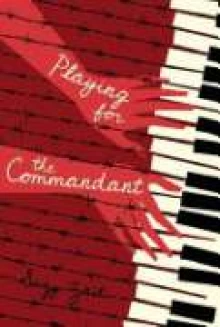
Playing for the Commandant
Written by Suzy Zail
Candlewick Press, 2014, 245 pp.
ISBN: 9780763664039
Why would a boy who had everything risk it all for a few Jews? The rest of the world wasn't interested in saving us. Why would Karl be any different? (p.130)
Fifteen-year-old Hanna considered herself a normal Hungarian teenager who, like many girls her age, had dreams. She loved the piano and dreamed of being a concert pianist, but she also dreamed of dancing with a boy and wearing pretty clothes. Her dreams are shattered, however, when the Nazis enter Hungary and start sending Jewish families to Auschwitz-Birkenau. Forced to leave their home at midnight, Hanna’s family has only enough time to gather a small case of items to take with them. One item Hanna takes is a black C sharp piano key that she hides in her skirt. She takes this small token to remember her dreams, her family, and her life before the concentration camp. Once at the camp, however, Hanna’s talent at the piano is what separates her from the other prisoners. Hanna auditions to play piano for the Commandant. She is selected and discovers that as long as her playing is pleasing, her life will be spared.
Playing for the head of the camp, however, places her within sight of the Commandant’s son Karl, who does not have the same feelings about Jews as his father. While his father is cruel, Karl is compassionate. When his father is not looking he passes food for Hanna to take back to the barracks. He talks with her about music and life before the Nazis took power. One night when Hanna inadvertently starts to play a forbidden piece of music by Mendelssohn, the Commandant demands to know the composer. Karl swiftly explains the piece is by Franz Hirsch, who does not exist, but Karl asserts was not popular except with musician students and critics. Saving Hanna’s life that night marks the beginning of a deeper friendship that eventually turns to love. Hanna and Karl know these deep feelings, if discovered, jeopardize both their lives. These feelings also create dissonance in Hanna, who wonders if she is betraying her family and her Jewish community.
This harrowing as well as romantic narrative would make a great companion to books such Rachel’s Secret (Shelley Sanders, 2012) and Rachel’s Promise (Shelley Sanders, 2013), or Between Shades of Gray (Ruta Sepetys, 2012) which detail the extent of anti-Semitic governments and the plight of Jews under such regimes. Playing for the Commandant would also make a nice addition to a Holocaust text set. An interesting story that could help students transition to some of the themes in Shakespeare’s Romeo and Juliet, this narrative will prompt discussions about wrestling with your conscience, determining how far people will go to survive, the atrocities and kindnesses shown in the worst time periods within history, and how often those who need help the most are silenced by the more powerful. This book has the potential to engage secondary readers in a study of caring across ethnic, geographical, and political barriers. This is a compelling story that will engage secondary readers.
Suzy Zail is the daughter of a Holocaust survivor and lives in Melbourne, Australia. Published in Australia under the title, The Wrong Boy, Playing for the Commandant is her first book for young adults, although she is the author of children’s books that have been published in Australia, Canada, and the United States. More information about her work can be found at Walker Books.
This book was named a 2015 Outstanding International Book by USBBY.
Holly, Johnson, University of Cincinnati, Ohio
WOW Review, Volume VII, Issue 3 by Worlds of Words is licensed under a Creative Commons Attribution-NonCommercial-ShareAlike 4.0 International License. Based on work at https://wowlit.org/on-line-publications/review/reviewvolumevii3.












